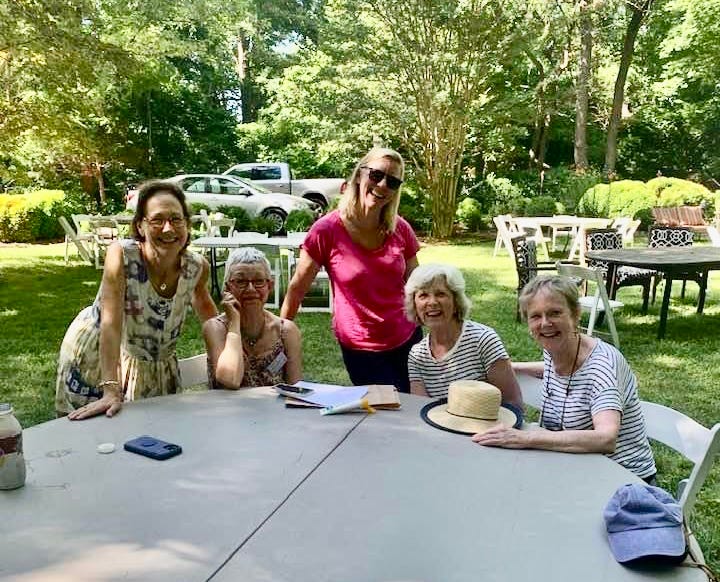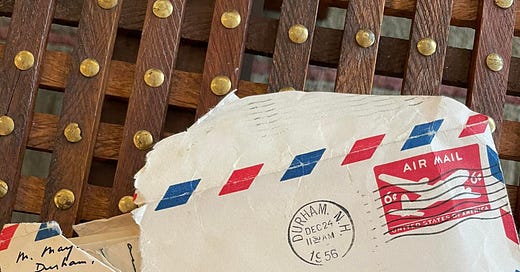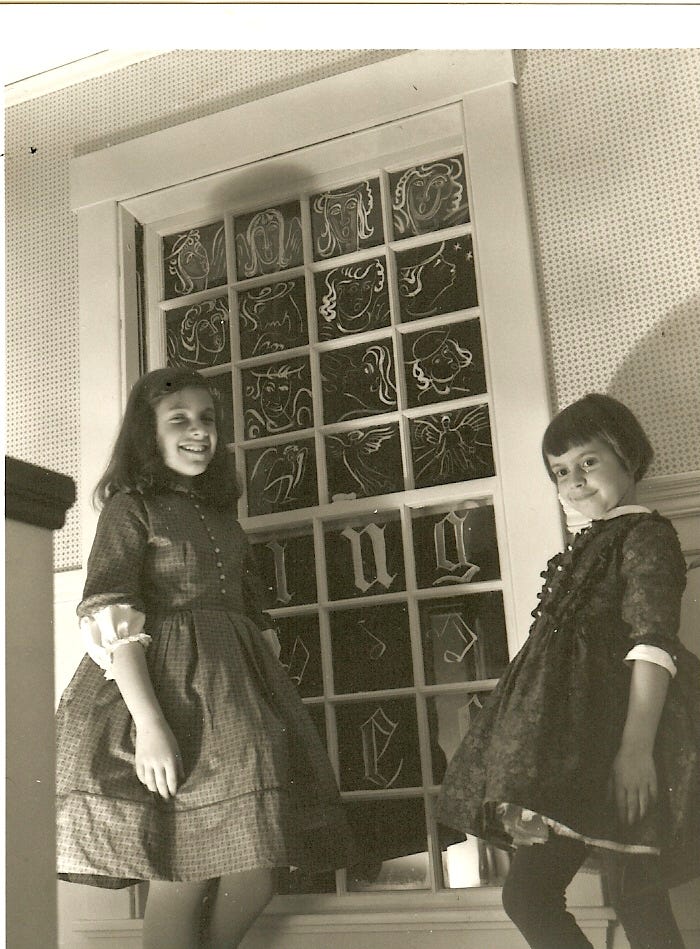The Lost Brother
When my father drove his family away, I lost them too. Long after he died, I found them and healed our wound.
“I’d like you to have this,” she said, placing a yellowed envelope in my palm as if she had been waiting for this moment. Everyone else at the Maynard reunion was chilling at the pool with a drink and a communal tube of sunblock. Rosemary and I stood alone at the command post, a dining room table strewn with photos of people who died before I knew we were family. My father and her grandfather were brothers, fellow champions of art and ideas who broke with a stern parental faith before breaking with each other. The envelope, ripped at the corner, might as well have been a pair of gold cufflinks for the tenderness with which Rosemary handed it to me.
I’d have known my father’s handwriting at 50 paces—the slant firm, the letters lean as fence posts. His Y plunged, his T flew like a banner. He drove his fountain pen with the same forward rhythm that powered his landscape paintings. Our house was his gallery, every wall proclaiming with color and line, “I am Max Maynard.” You had to live there to find the flourishes left with his pen. They appeared on the flyleaf of Silent Spring, the lecture notes beside his bowl of oatmeal. His students’ blue books, if he got around to marking their exams before the vodka called.
My father’s letters were a private matter, composed at night behind the closed door of the dusty lair he called a study. On his bookshelf, with The Divine Comedy and Boswell’s life of Johnson, stood a Hellman’s jar in case he was too far gone to trust his aim in the bathroom. None of us knew precisely what went on that room the color of algae on a pond. We did know he wrote letters, especially to far-flung Maynards he hadn’t seen for years. Christmas had a way of loosening his pen. Between Max and his fellow Maynards there was precious little comfort and joy. The letter in my hand, to his widowed sister-in-law, was postmarked Christmas Eve, 1956. I was seven, my heart set on a dollhouse under the tree.
My father didn’t know his sister-in-law’s address. “Port Washington, Long Island, New York,” he’d written in blue ink somber as a banker’s suit. Yet the letter found its way to Kathleen Maynard, second wife of his brother Theodore, and then down two generations to his granddaughter Rosemary, my cousin once removed.
I had to read the letter on the spot, although it sent a shiver through me. My father revered the older brother he had lost, never spoke his name without longing. But when Theodore died, two months passed before he wrote to Kathleen. She had torn the envelope in haste, as if she couldn’t wait to be done with Max Maynard.
By day my father was the king of Christmas. He led the annual quest for the loveliest tree in all southern New Hampshire. When it fell a tad short of his standards, he’d rearrange the branches with shears and wire. Every Maynard tree brushed the ceiling, so heavy with ornaments that he would tether it to nails in the wall. One year he outdid himself, painting a choir of angels on our landing window. We watched his brush dance as the angels came to life, curls fluttering in a celestial breeze. I dared hope for the greeting-card Christmas that never arrived.
By night my father poisoned Christmas. He would slump in the Danish teak chair, his glass of beer a cover for vodka swigged in private. We tiptoed for fear of setting him off. I never understood why Christmas made him moan and rake his hair until it stood on end. Something to do with the Maynard family. Tormenting failures that shattered their trust.
Other kids gathered with relatives at Christmas. Tables rang with laughter; foyers gleamed with melted snow from many boots. My sister and I were not so lucky. The manic abundance of our Christmas—batch upon batch of cookies, piles of not-quite-affordable presents—was like a shiny bow and silver paper on a box of loneliness I couldn’t lose. Decade after decade, it arrived at my door in the season of lights and tinsel.
My father was the second-youngest of seven surviving children born to Thomas Henry and Eliza Maynard, Plymouth Brethren missionaries. In a family photo taken circa 1905, he’s a winsome toddler in a dress with a ruffled collar bigger than a dinner plate. Theodore, 13 years his senior, wears a suit identical to his father’s and the superior half-smile of an oldest child accustomed to lording it over the youngsters.

My Maynard grandparents devoted their lives to one purpose: preparations for the Second Coming. Their faith was a rod of iron. On Sunday they forbade all toys and all books except the Bible. For the sin of painting on the Sabbath, my father lost his paintbox for a year. He turned his back on the Brethren at the first opportunity to cast his lot with artists and writers. Theodore had already broken with the faith, in the worst way Thomas and Eliza could imagine. They detested Catholics, who in their eyes had sold out Christ to the Pope and his army of gilded minions. Theodore had the gall (or the moral courage, as Max must have seen it) to desert their cause and join the enemy. Said Eliza, “I’d rather see you dead.”
Theodore became a poet with a formidable literary network (Millay, Shaw, Yeats). His autobiography, The World I Saw, shows a wry wit and a zest for storytelling that compensates to some degree for my father’s pained silence on the details of his childhood. By way of explanation, he would quote the King James Bible: “When I was a child, I spake as a child, I understood as a child, I thought as a child; but when I became a man, I put away childish things.”
Southern India, where Thomas and Eliza ran a mission, was the first home my father knew. He admitted to having seen a tiger, but the only big cat he cared to discuss was William Blake’s. Theodore, by contrast, gave tigers their thrilling due. “Even when I was tucked between the sheets I could hear [tigers] prowling outside the window. One night when I was about five I was awakened by a tiger licking my hand…. My screams brought the family rushing in, and everybody assured me that I was quite mistaken; no tiger could possibly be there. I knew better; I had seen the tiger.”
I pulled the letter to Kathleen from its six-cent airmail envelope. Three sheets, folded in thirds, their edges perfectly aligned. My father sent it on its way at 11:30 a.m., almost time for lunch. He’d have parked at Newsky’s, the grocery store across from the post office. He might have dashed in for a can of soup. My mother took pride in her own chicken soup and always kept a jar on hand but he had an odd affection for the Campbell’s version.
He’d have knocked back a few to write the letter, yet he formed his letters like an artist. I braced myself as I did in childhood—as we all did, never speaking the word “drunk” or “alcoholic.” How badly did Max Maynard blow it with Theodore’s grieving widow?
“I don’t know what to say to you,” he begins, the “I” bleeding ink from the pressure of his pen. He then finds a great deal to say, all of it about his own regrets. First, missing the funeral. Our family had to move; the buyer of our old house would give us no quarter. “Please don’t think it was callous indifference that kept me here. Of all my family Theo was the one I most admired…and most loved.”
The letter already reads like an object lesson in how not write condolences. And my father is just getting started. After he became a family man, Theo and Kathleen made an ill-starred visit to my parents in New Hampshire. “An utter failure,” he writes. “And it was all my fault…. I now remember (and with deep sadness) how warm and friendly you both were and how negative, cold, stumbling and apathetic I was.”
Code for “drunk.”
He meant to write a letter of apology. Hoped Theo would extend an olive branch. Now he begs Kathleen to forgive him. “Can you understand, Kathleen, that the legend of Theo made it difficult for me?”
I imagine myself in Kathleen’s position. Max has just beseeched her to get inside his guilt-ridden head. He urges her, freshly widowed, to share his desolation at Christmas (“carols over the radio, carols in the shops”). He begs her to visit us at the new house. The last place in the world she’d want to be.
I grew up raging at my father’s violation of every social norm. Negative, cold, stumbling, apathetic. Hell, yes. What I’d missed was the depth of his shame, his terror at being judged. His parents had warned him to prepare for the last trumpet, when the saved would rise up to sit at God’s right hand while the damned would burn forever. He thought he’d rejected all that, but still dreaded the judgment of those he’d offended. He tells Kathleen, of that disastrous visit to New Hampshire, “I suppose you went away thinking I had been deliberately repelling.”
Repelling. A cudgel of a word to turn against oneself.

At the Maynard reunion, late afternoon sunlight streamed through the dining room window. Outside I heard action at the barbecue. A few minutes had passed, yet it seemed like 66 years. Rosemary was still beside me.
Had Max and Theodore found a way to be brothers, I might know Rosemary from a childhood road trip. My family drove nowhere if we couldn’t be home by teatime, but maybe hers had a sense of adventure. We could have frolicked in a sprinkler together and sent each other letters with tiny hearts in the margins. Yet here we were, a few dozen Maynards gathered for a long weekend’s merriment on Chesapeake Bay. A country band was about to set up. Grownups would dance while kids blew bubbles. I couldn’t imagine more fun on the Fourth of July—although, in my heart, it was Christmas.
Has a falling-out scarred your family? Have you found a way to make it right? This is the place to share your experience. Don’t be shy—we’re a big-hearted group. And I’ll do my best to answer every comment.
If this essay touched you, check out “Please Call Your Sister” from this time last year. (What is it with hurting families and Christmas?) Browse away; all my posts free to read. A tiny percentage of my readers have chosen a paid subscription just because they value my work. If now’s the time for you to join them, I will feel like dancing. Tapped out? Not doing paid subscriptions? I get it. Besides, there are other ways to cheer me on—click the heart, share the post, recommend Amazement Seeker in your own stack.
You have all been my hands-down highlight of 2024—the year in which life as I’d known it fell apart after a series of blows culminating with the death of my dog, muse and steadfast companion on my quest for amazement. Your encouragement and good humor kept me focused on the story at hand. Where there’s a story in progress, there is hope. And a bridge to readers who will recognize themselves in the tale.







Lovely writing, as always. I settle in for a good read anytime I see a new post from you.
Other people’s families have long fascinated me. My own seemed more a collection of snapshots than vignettes. Other than that is the long long saga of our grandmother.
My mother’s sister and she were close enough to share holidays but not regular visits. We cousins grew up together except Jean who was nine years older than I was. In her teen years she might have absented herself from our holidays. There was political tension at the table and there was our old grandmother referred to as senile. Over a lengthy decade she lived mainly at our house as the cousins’ father had frequent sabbaticals to far away places. There was Hawai’i before statehood, Guatemala, Chile, Ethiopia- places the grandmother would not visit. She required according to our mothers constant attention lest she have a “spell”, fall, and break her hip. Her seizures were called petit mal, and somewhat controlled by Dilantin. One knew when she had one coming on as she would begin to hum. It was deemed necessary to move her to a sofa to lie down until it passed. She moved so slowly anyway, her feet shuffling half a footstep at a time, that her seat at the table was invariably the one nearest the doorway.
It was not long before our grandmother was required to spend all day on the sofa lest she fall over in a more silent spell and break her hip. My mother declared that most older people had their hips break and then fall over, a catastrophe.
My mother then spent her days sitting in a chair next to the sofa upon which rested my grandmother covered in an afghan, watching Walter Cronkite while my mother made dinner. My grandmother would talk to Walter, demanding to know why he never stayed for dinner.
Once my grandmother escaped from the house and wandered the neighborhood, telling people my mother was pregnant again. This was a nearly unbelievable feat given her overall lack of physical capacity. She must have had a burst of energy. And no broken hip.
We attempted a family vacation, six of us crammed into the Oldsmobile, our first reliable car that did not overheat and leave us standing by some forlorn and dusty train tracks. We headed off to Harstine Island in the Puget Sound, site of a previous stolen set of summer days when there had been no sabbatical, a house owned by family friends. When we got there after two days on the road including a night in Coos Bay at a motor inn with all the beds in one room, our grandmother needed to go to the bathroom. The water to the house had been turned off. When my father could not find the valve right away, my mother insisted we turn around and go home. Which we did.
I tell this story because as a teenager I was full of blame. I blamed my mother most of all for destroying our family life by insisting her mother live with us and consume her with her neediness, spawning thoughts of physical disaster in the offing. I blamed my uncle and his sabbaticals that meant our grandmother was occupying our sofa far more than theirs. I blamed my grandmother’s sons for living their lives in Cuba and New Orleans and Pasadena without a care in the world and never once even making the drive to California where we languished year upon year with Grandma and Walter Cronkite and the endlessly occupied sofa. When my father died the summer after my grandmother’s demise from or with a broken hip my bitterness was complete.
My little sister had such different memories you would not think it was the same family. For Christmas this year I gave her a restoration of her cherished photo of our little grandmother for whom she is named and our tall father. It is her first Christmas without her husband of 49 years. We had an excellent holiday from our regular lives, playing cards as we did long ago, laughing like hooligans over trivialities and bozo moves in the game.
Thank you for this opportunity to shake out the family linens, long stored in the cupboard. Thank you for your stories.